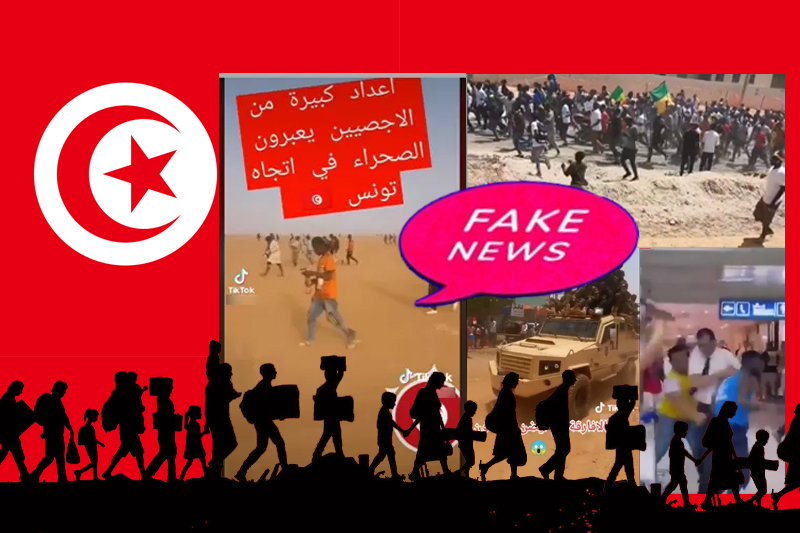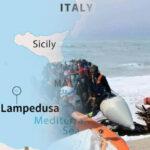
tunisia migrants false content goes viral on social media
An anti-migrant sentiment wave has spread false and misleading videos about migrants from sub-Saharan Africa in Tunisia.
Tunisian president Kais Saied said migration was a “plot” to change the country’s demographic profile, and Ivory Coast and Guinea have begun repatriating their nationals due to safety concerns.
Several videos are circulating online purporting to show African migrants in Tunisia, but they are filmed elsewhere.
Tunisia is not experiencing migrant protests
In several TikTok videos posted recently, large groups of people run along a street in an angry protest.
A video with millions of views says “Tunisia under occupation.” Another says “Tunisia has become the kingdom of Africans.”
However, the event shown took place in Senegal’s capital, Dakar.
As the person filming moves around, you can see an obelisk in the Place de l’Obélisque in the Senegalese capital.
We have also confirmed that the language heard is Wolof, the national language of Senegal.
In June 2022, an opposition protest took place in Dakar that led to the event
Migrants are not to blame for traffic chaos
Other TikTok videos falsely claim that street protests are taking place in Tunisia involving African migrants.
A widely shared picture shows groups of people who appear to be from sub-Saharan Africa confronting drivers and bystanders on a busy road.
The Arabic label reads: “Occupation by sub-Saharan Africans of more than one Tunisian province.”
Based on clues in the video, we’ve confirmed that it’s not Tunisia, but Morocco.
On one red car, a sign on the roof reads “small size” in Arabic, which is a feature of red-colored taxis in Casablanca, Morocco.
It is hard to see the rear number plate, but it does have an initial five digits, as you would expect from Moroccan plates.
Some of the Arabic spoken has a Moroccan accent, as we heard in the dialogue at one point.
Tunisia is not the destination of these migrants
A recent TikTok video shows groups of men walking across an open desert, captioned: “A large number of sub-Saharans crossing the desert toward Tunisia.”
There is, however, an earlier TikTok post featuring a longer version of the same video. It was posted in September 2022 by a man recording his travels away from Algeria.
The later video has been zoomed in slightly and has writing obscuring parts of the image, but all the same, characters appear wearing the same clothes, including a man carrying a pink and white striped bag.
According to aid agencies, Algeria expelled thousands of migrants from sub-Saharan Africa last year.
According to another video posted by the same man, he arrived in Bamako, the capital of Mali, after crossing the Sahara desert southward.
Keep Reading
Armored vehicles are not used to transport migrants
There is another video with tens of thousands of views showing vehicles full of armed men driving along watched by bystanders.
“The Africans are also armed.” One of the Arabic hashtags below reads: “Africans in Tunisia.”
An earlier posting of this video said it was filmed in Sudan and elements in the video support that claim.
A shop along the roadside advertises Tapco, a Sudanese oil and lubricant company.
On one of the passing vehicles, we can also see a white, red, and green emblem, which represents the Sudanese flag.
The red berets and white belts worn by the soldiers are known to be worn by certain units of the Sudanese military.
An Arabic word on one of the shop fronts in the video describes rickshaw taxis in a distinctively Sudanese way.
An old video of an airport incident
Some videos have been taken out of context to gain sympathy for sub-Saharan Africans in Tunisia.
In a Twitter post, an airport employee and security personnel are restraining a man involved in a fracas at a Tunisian airport.
According to the post, “Black Africans in Tunisia are being attacked even as they try to leave…”.
According to some comments on the post, this incident occurred in Tunisia in July 2022.
Several news outlets reported it at the time, including in the UK. It’s not part of the current wave of anti-migrant sentiment.
The broader context is that migrants from sub-Saharan Africa have been harassed and assaulted in Tunisia, leaving many fearing for their safety.
Also Read:- Major Canadian school board recognizes caste-based discrimination









